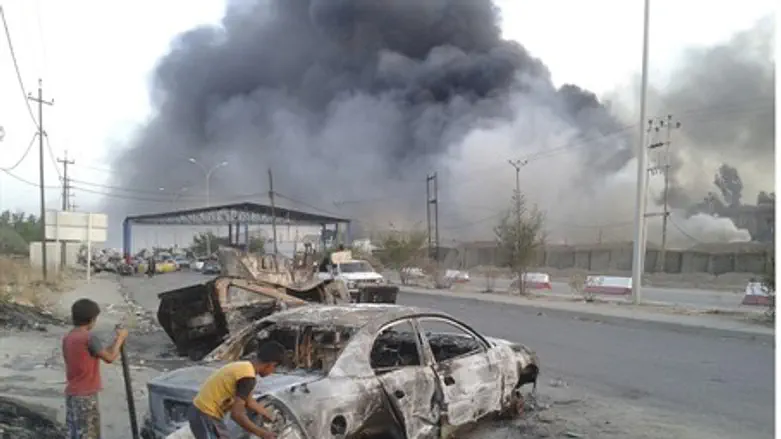
Iraqi officials have expressed irritation and analysts skepticism at the US prediction that an offensive to retake Iraq's key city of Mosul from jihadists could be launched in April-May.
Mosul is a major hub for the Islamic State (ISIS) group and holds special significance as the place where jihadist leader Abu Bakr al-Baghdadi proclaimed his "caliphate" straddling Iraq and Syria.
It has been under the jihadists' full control since the second day of their June offensive in Iraq, but federal and Kurdish forces have been slowly closing in, reports AFP.
An official with the US Central Command said last week that "the mark on the wall we are still shooting for is the April-May timeframe."
The rationale is to launch the operation before the Muslim fasting month of Ramadan, which will start in mid-June, and searing summer temperatures, he said.
US President Barack Obama's envoy for the international coalition against ISIS, John Allen, said in October that any attempt to wrest back Mosul, Iraq's second city, could be a year away.
Iraq's defense minister, Khaled Obeidi, was irate that the Pentagon would call a date for the Mosul battle.
"A military official should not disclose the date and time of an attack," he told reporters on Sunday. "The timing is up to (Iraqi) military commanders. Where this American official got his information from, I don't know."
In a possible sign of the sensitivities of such issues, these comments were cut out of video footage of his press conference subsequently posted online by the defense ministry.
Together with Iran, the United States has been Iraq's top foreign partner in the war against ISIS and has launched almost daily strikes around Mosul since August 2014.
Some Iraqi officials have been gung-ho about a Mosul offensive, arguing that no more time could be wasted to claim the country back, but preparations have been slow.
Mosul, biggest operation ever for Iraqi army
Hakim al-Zamili, a lawmaker and senior leader in the Sarayat al-Salam Shi'ite militia, argued it was more pressing to liberate the western province of Anbar, which borders Baghdad.
"We need more time (for Mosul)...maybe by the end of the year," he told AFP. "The army needs more training, equipment, and arms to be able to do this."
"Yes we want to liberate Mosul and we support its liberation, but there are important flashpoints that need to be secured and we should not stretch ourselves too thin," Zamili said.
Mosul is a large city whose population was estimated at close to two million prior to the June 2014 ISIS assault.
Ten years ago, it took 10,000 highly trained US marines to clear Fallujah, a city the fraction of Mosul's size.
With Mosul, "the challenge is enormous, it would be a bigger operation than the post-Saddam Iraqi military has ever accomplished," said Nate Rabkin, the managing editor of the Inside Iraqi Politics newsletter.
Months of coalition air strikes have weakened ISIS's grip on the Mosul region, cutting some supply roads and destroying some of the military equipment they had seized from the army.
But the US Central Command official said 20,000-25,000 federal, Kurdish and Sunni tribal forces would be needed to defeat 1,000-2,000 ISIS fighters in Mosul.
"It would be extremely difficult to get these numbers of Iraqi army forces or ministry of interior forces into Mosul by summer 2015," said Michael Knights of the Washington Institute.
The United States officially has hundreds of forces in Iraq, advising and training the army, but there is no sign that process is near completion.
Beyond just finding the manpower, the Iraqi army would need to achieve a quantum leap in logistics to coordinate and supply different forces in a broad operation.
Relations between the autonomous Kurdish government and the federal authorities in Baghdad, currently strained by a revenue-sharing dispute, would also have to improve.
Knights said the timeframe given by the Pentagon official may have been more of a political message that a blurted military secret.
"I think it is a misstatement of US policy," he said, arguing that everything so far suggested Washington was trying to slow Baghdad's schedule down rather than pushing for quick action. "Maybe Iraq wants to go next week, and this is our attempt to hold them off till later."
